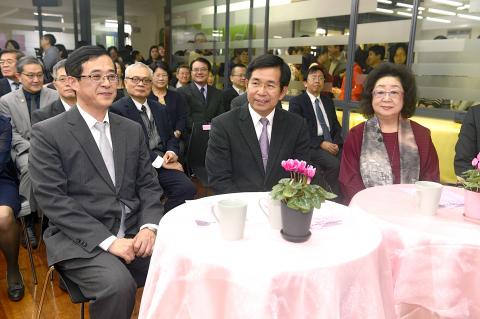Minister of Education Pan Wen-chung (潘文忠) yesterday said he returned to the ministry in the hope of completing the policies he had previously planned.
“Premier Su Tseng-chang (蘇貞昌) asked me to reassume the position because many of the policies I have planned are still in the process of being implemented and time is a bit tight at the moment,” he said after being sworn in.
“The premier says I am responsible for ensuring that the policies are successfully carried out. I know that is a huge responsibility, but I am willing to shoulder that,” he added.

Photo: George Tsorng, Taipei Times
The new 12-year curriculum guidelines, which are to take effect on Aug. 1, are a “big change for students,” he said.
He had planned the details and budgets for new textbooks, facilities and equipment required under the new guidelines and would do his best to work with schools to implement them, he said.
While former deputy minister of education Yao Leeh-ter (姚立德) is to return to teaching at Taipei National Taipei University of Technology, Deputy Minister of Education Fan Sun-lu (范巽綠), who had tendered her resignation on Sunday, would stay on in her position to help with the implementation of the guidelines, he said.
Fan has experience in compulsory education, which is a skill the ministry needs, he added.
Pan had stepped down as education minister less than a year into his term in April last year over controversy surrounding the election of National Taiwan University president Kuan Chung-ming (管中閔).
He had expressed hope that his resignation would end the political manipulations surrounding the issue that were causing “unnecessary stress and burden” to the ministry.
Following his resignation, two more education ministers stepped down over the election, while Kuan was appointed on Tuesday last week.
In response to media queries yesterday whether he felt wronged for having to step down, Pan said he did not feel that way.
“The election involved many controversies, but I felt it was a good thing that the flaws in the election system were exposed,” he said, adding that he had reviewed the system hoping to improve transparency in the election process while protecting university autonomy.
National Federation of Teachers’ Unions director-general Huang Yao-nan (黃耀南) on Sunday said that the new minister must deal with a number of pressing issues, such as the new curriculum guidelines and the transformation of private universities.
“Compared with previous curriculum changes in 2006 and 2010, this year’s changes are more extensive and require more supplementary measures and resources,” Huang said.
Having planned the curriculum guidelines, Pan is familiar with the policy, “but hopefully he would hold his ground and not compromise so easily under political pressure this time,” he added.
National Alliance of Parents Organizations chairman Hsieh Kuo-ching (謝國清) said that teachers and parents’ associations are happy to see Pan return, adding that they hope he would stay in the position until next year.
Hopefully Pan would help ensure a smooth transition for teachers and parents when the new curriculum guidelines take effect, he added.
Additional reporting by Chen Yu-fu, Rachel Lin and Wo Po-hsuan

Taiwan would welcome the return of Honduras as a diplomatic ally if its next president decides to make such a move, Minister of Foreign Affairs Lin Chia-lung (林佳龍) said yesterday. “Of course, we would welcome Honduras if they want to restore diplomatic ties with Taiwan after their elections,” Lin said at a meeting of the legislature’s Foreign Affairs and National Defense Committee, when asked to comment on statements made by two of the three Honduran presidential candidates during the presidential campaign in the Central American country. Taiwan is paying close attention to the region as a whole in the wake of a

President William Lai (賴清德) has appointed former vice president Chen Chien-jen (陳建仁) to attend the late Pope Francis’ funeral at the Vatican City on Saturday on his behalf, the Ministry of Foreign Affairs said today. The Holy See announced Francis’ funeral would take place on Saturday at 10am in St Peter’s Square. The ministry expressed condolences over Francis’ passing and said that Chen would represent Taiwan at the funeral and offer condolences in person. Taiwan and the Vatican have a long-standing and close diplomatic relationship, the ministry said. Both sides agreed to have Chen represent Taiwan at the funeral, given his Catholic identity and

Chinese Nationalist Party (KMT) Chairman Eric Chu (朱立倫), spokeswoman Yang Chih-yu (楊智伃) and Legislator Hsieh Lung-chieh (謝龍介) would be summoned by police for questioning for leading an illegal assembly on Thursday evening last week, Minister of the Interior Liu Shyh-fang (劉世芳) said today. The three KMT officials led an assembly outside the Taipei City Prosecutors’ Office, a restricted area where public assembly is not allowed, protesting the questioning of several KMT staff and searches of KMT headquarters and offices in a recall petition forgery case. Chu, Yang and Hsieh are all suspected of contravening the Assembly and Parade Act (集會遊行法) by holding

Lawmakers from the Democratic Progressive Party (DPP) yesterday established a friendship group with their counterparts in Ukraine to promote parliamentary exchanges between the two countries. A ceremony in Taipei for the Taiwan-Ukraine Parliamentary Friendship Association, initiated by DPP Legislator Chen Kuan-ting (陳冠廷), was attended by lawmakers and officials, including Deputy Minister of Foreign Affairs Francois Wu (吳志中) and European Economic and Trade Office in Taiwan Director Lutz Gullner. The increasingly dire situation in Ukraine is a global concern, and Taiwan cannot turn its back when the latter is in need of help, as the two countries share many common values and interests,